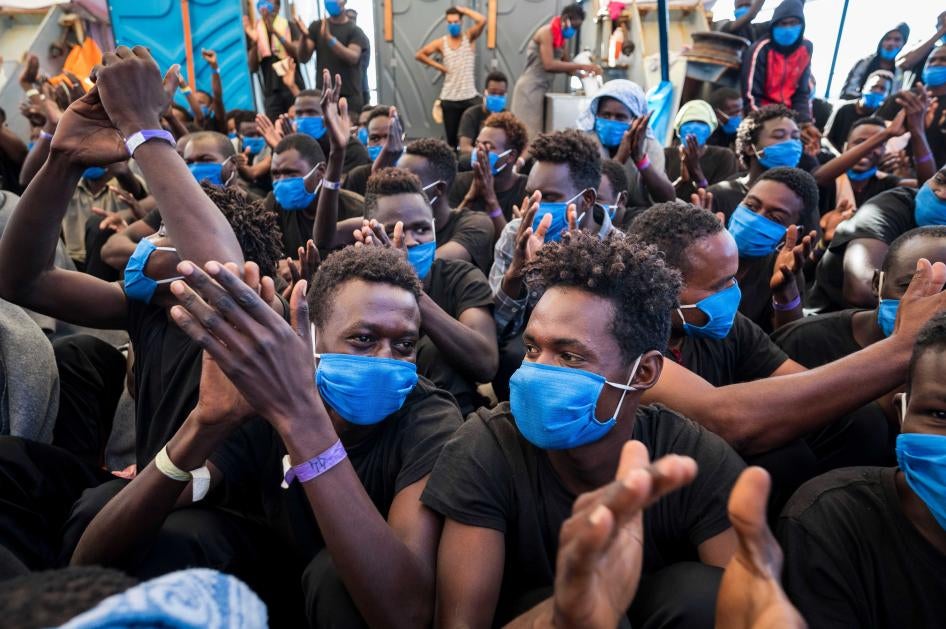(Milan) – The Italian parliament’s Constitutional Affairs Committee should endorse certain key amendments to draft immigration legislation, Human Rights Watch said today. The amendments would abolish sanctions on rescue ships, reject the concept of “safe country of origin,” and provide a pathway to protection for people who have lost their protected status in the past two years.
“This is the chance for Italy to turn the page on a miserable period in its history,” said Judith Sunderland, acting deputy Europe and Central Asia director at Human Rights Watch. “In this next chapter, Italy should not only restore rights and protections shredded by the previous government, but it should set an example of principled and fair migration policy.”
In early October 2020, the Italian government adopted a new immigration decree that significantly modified two so-called security decrees, issued in 2018 and 2019, by the previous government. The parliament’s Constitutional Affairs Committee is currently examining amendments that would take effect when the decree becomes a law, which could significantly improve protections and rights of migrants and asylum seekers.
The committee has already voted to expand the grounds for granting special – or complementary – protection to asylum seekers and to increase safeguards against returns to countries where their safety or rights would be at serious risk. These improvements had been advocated by Italian nongovernmental organizations and experts in networks such as the Tavolo Asilo and Grei250.
As its work continues, the committee should correct some deeply problematic aspects of the previous government’s migration and asylum policies that remained in the latest decree, Human Rights Watch said. The committee should vote in favor of amendments to:
Abolish fines on nongovernmental rescue ships. The June 2019 decree, converted into law in October 2019, gave the interior minister the authority to deny permission to enter or stay in Italian waters to any ship under suspicion of violating Italian immigration laws, including rescue ships carrying people to a safe port of disembarkation, in compliance with international law. It imposed fines of between €150,000 (US$177,500) and €1 million ($1,183,275) on shipmasters, and immediate seizure of the ship for entering Italian waters without authorization or failure to obey instructions.
The decree issued in October maintains that authority but reduces the fines to a maximum of €50,000 ($59,000). The decree exempts ships that have performed rescue operations on certain conditions, including that shipmasters have complied with “the indications of the competent authority for search and rescue at sea.” But this requirement leaves open the possibility to fine a rescue ship that refuses to follow instructions to disembark rescued people in Libya, where they risk grave human rights abuses.
The threat of fines under this provision is part of a broader policy to obstruct nongovernmental rescue organizations and risks discouraging other shipmasters from fulfilling their moral and legal obligation to respond to ships in distress at sea, Human Rights Watch said.
Repeal the list of safe countries of origin. The October 2018 decree, when converted into law in December of that year, introduced into Italian law the concept of “safe country of origin,” and the government adopted a list of 13 countries in October 2019. Asylum applications by nationals from these countries are subject to a fast-track procedure on the presumption they are not in need of international protection. While allowed under international refugee law and European Union law, the use of safe country concepts in accelerated procedures raises concerns over hasty and poor-quality decision-making, especially in complex cases, and the potential for expulsions of people who face a risk of human rights violations. In July 2015, a Canadian Federal Court ruled that Canada’s list of “safe countries of origin” was unconstitutional because it was “discriminatory on its face.”
Restore Access to Complementary Protection. Among the most important measures in the October 2020 decree is to reinstate in Italian law the residency permit on humanitarian grounds (now called “special protection”). In years past, this measure allowed many people to remain in Italy due to hardships experienced at home or on their migration journeys, or due to risks they might face upon return. Complementary protection is a term used to refer to grounds for protection that go beyond the definition in the 1951 Refugee Convention.
The measure is not retroactive, however, and will only be available to individuals with pending asylum applications. The Constitutional Affairs Committee should amend the decree to create a system allowing people to apply for special protection if in the period from October 2018 to October 2020 their humanitarian permit expired and they were unable to renew or convert it, and those whose asylum application was rejected at first instance but who may have a claim to receive special protection.
In Italy, parliament can amend measures put into effect by government decree when these are converted into law, within 60 days of the decree’s adoption. The Constitutional Affairs Committee is examining hundreds of amendments and may forward a consolidated text to the plenary as early as November 27. Many observers expect the government to impose an accelerated procedure (“fiducia”) that precludes further debate before a vote.









